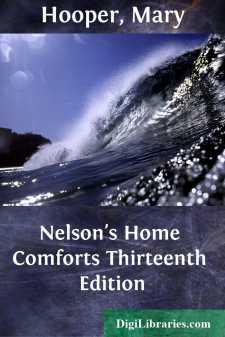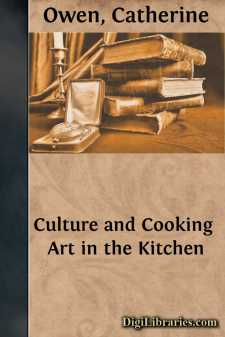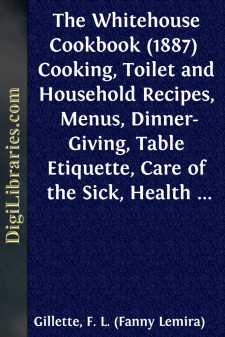Cooking
- General 70
- History 1
- Reference 10
- Regional & Ethnic 3
- Vegetarian 10
Cooking Books
Sort by:
by:
Edith Thomas
CHAPTER I. MARY'S LETTERS RECEIVED AT CLEAR SPRING FARM. One morning in early spring, John Landis, a Pennsylvania German farmer living in Schuggenhaus Township, Bucks County, on opening his mail box, fastened to a tree at the crossroads (for the convenience of rural mail carriers) found one letter for his wife Sarah, the envelope addressed in the well-known handwriting of her favorite niece, Mary...
more...
by:
Robert May
To the Right Honourable my Lord Montague, My Lord Lumley, and my Lord Dormer; and to the Right worshipful Sir Kenelme Digby, so well known to this Nation for their Admired Hospitalities. Right Honourable, and Right Worshipful, HE is an Alien, a meer Stranger in England, that hath not been acquainted with your generous House-keepings; for my own part my more particular tyes of service to you my Honoured...
more...
by:
Various
MY PET RECIPES TRIED and TRUE CONTRIBUTED BY THE LADIES AND FRIENDSOF ST. ANDREW'S CHURCHQUEBEC "We may live without poetry, music and art; We may live without conscience, and live without heart; We may live without friends; we may live without books; But civilized man cannot live without cooks."—Owen Meredith. QUEBEC "DAILY TELEGRAPH" PRINTING HOUSE 1900 Rhymes to Remember......
more...
INTRODUCTORY CHAPTER The true economy of housekeeping is simply the art of gathering up all the fragments, so that nothing be lost. I mean fragments of time, as well as materials. Nothing should be thrown away so long as it is possible to make any use of it, however trifling that use may be; and whatever be the size of a family, every member should be employed either in earning or saving money....
more...
by:
Mary Hooper
PREFACE. In presenting our friends and the public with the thirteenth edition of our "Home Comforts," we have the pleasure to remark that so greatly has the book been appreciated, that the large number of FIVE HUNDRED THOUSAND copies has been called for. The value of the Jubilee Edition was enhanced by some new recipes; these are repeated in the present edition, to which, also, some valuable...
more...
by:
Mary Randolph
SOUPS ASPARAGUS SOUP. Take four large bunches of asparagus, scrape it nicely, cut off one inch of the tops, and lay them in water, chop the stalks and put them on the fire with a piece of bacon, a large onion cut up, and pepper and salt; add two quarts of water, boil them till the stalks are quite soft, then pulp them through a sieve, and strain the water to it, which must be put back in the pot; put...
more...
by:
L. O. Kleber
Introduction There are cook books and cook books, and their generation is not ended; a generation that began in the Garden of Eden, presumably, for if Mother Eve was not vastly different from her daughters she knew how to cook some things better than her neighbors, and they wanted to know how she made them and she wanted to tell them. Indeed, it has been stated that the very first book printed, a small...
more...
by:
Catherine Owen
a few preliminary remarks Alexandre Dumas, père, after writing five hundred novels, says, "I wish to close my literary career with a book on cooking." And in the hundred pages or so of preface—or perhaps overture would be the better word, since in it a group of literary men, while contributing recondite recipes, flourish trumpets in every key—to his huge volume he says, "I wish to be...
more...
GENERAL DIRECTIONS. The following directions may appear trite and common, but it is of the greatest consequence that they be strictly observed: Attend to minute cleanliness. Never wipe a dish, bowl, or pan, with a half dirty napkin, or give the vessel a mere rinse in water and think that it is then fit for use. See that it be dried and pure from all smell before you put in any ingredient. Never use the...
more...
CARVING. Carving is one important acquisition in the routine of daily living, and all should try to attain a knowledge or ability to do it well, and withal gracefully. When carving use a chair slightly higher than the ordinary size, as it gives a better purchase on the meat, and appears more graceful than when standing, as is often quite necessary when carving a turkey, or a very large joint. More...
more...











